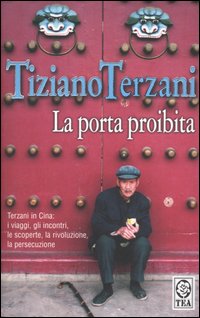 La porta proibita
La porta proibita

Nel febbraio 1984 Tiziano Terzani fu arrestato a Pechino, perquisito, interrogato ed, infine, espulso dal Paese. Per quattro anni vi aveva vissuto con la famiglia, cercando di sentirsi "cinese": aveva mandato i suoi figli alla scuola locale, aveva raggiunto luoghi sconosciuti al turismo, aveva visto una Cina diversa da quella che appariva in superficie. Ricco di notizie e dati, di considerazioni ed impressioni, questo libro è al tempo stesso un reportage, un diario di viaggio, un saggio di sinologia contemporanea e l'appassionante romanzo di un'avventura umana.
|
|
From Publishers Weekly
While a student at Columbia University in the 1960s, Terzani, who was born and raised in Italy, came to believe so deeply in the Maoist goal of creating a socialist utopia that he became fluent in Chinese, adopted a Chinese name and applied to the Chinese government for permission to move to the People's Republic, which was granted in 1980. This volume chronicles his four years there and his disillusionment not only with Mao's regime, but with Deng Xiaoping's as well. He describes the destruction of much of China's cultural legacybuildings, shrines, artworkfrom Peking to the outermost provinces; the rampant pollution; discrimination against minorities, notably Tibetans; the loss to the people of many traditional amenities (Mao termed pets "bourgeois indulgences" and had the animals killed). Terzani argues that Western views of Deng as a liberal ruler guiding his nation along a capitalist road are naive; that Deng's overriding goal is the maintenance of party control; that his chief modernization has been the streamlining of the police apparatus along the lines of the KGB. As a result of the reports on China he published in European journals, Terzani was arrested and expelled from the country. He concludes, "The Chinese remain the greatest illusionists in the world. Only the illusion changes." Terzani is now der Spiegel's Far Eastern correspondent, based in Tokyo. (August 11)OOD MORNING, I'M JOAN
Copyright 1987 Reed Business Information, Inc.
From Library Journal
Terzani lived in China for more than three years as a correspondent for Der Spiegel. He arrived with an attraction for China and a determination to assimilate: he spoke Chinese, read Chinese papers, and sent his children to Chinese schools. The experience turned him sour and left him feeling "if Mao's policies had brought China great misery, what Deng Xiaoping was doing in order to half-reverse those policies left me equally skeptical." The Chinese didn't like his articles or his attitude and expelled him in March 1984. His articles, collected here, make fascinating reading. The best are those that capture the real and often frightening contradictions in the 1980s reform policies for industry, agriculture, and family planning. Terzani's view is similar to that of Simon Leys, whose Chinese Shadows ( LJ 7/77) charged that Beijing had destroyed the traditional Chinese heritage and substituted narrow Leninist dogma to produce an impoverished culture.David D. Buck, History Dept., Univ. of Wisconsin-Milwaukee
Copyright 1986 Reed Business Information, Inc.
|